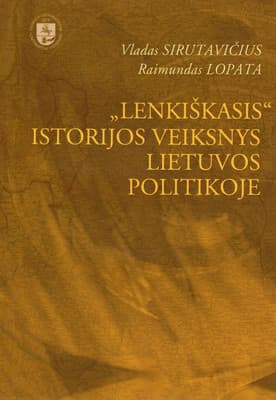
Original title: „Lenkiškasis“ istorijos veiksnys Lietuvos politikoje
Publishing date: 2011
Publisher: Vilniaus universiteto leidykla
Language: Lithuanian
Pages: 116
Description:
The book consists of two articles. The first article analyses the genesis of Lithuanian and Polish friendly relations and good neighbourhood cooperation in 1944. The researchers focuses on the genesis of international treaties and identification of the external mechanism. The aim of this analysis is to answer the question as to what was the role of the assessment of the Suwałki Treaty when drafting the international treaty of 1944. Several circumstances, which had a direct influence on the signing of the treaty, are important for the answer to the above question. The first circumstance is a certain tradition of assessing the Suwałki Treaty formed in the historical conscious of Lithuania. The second circumstance is the importance of assessment of the historical past. The second text analyses public and political discussions over the Republic of Lithuania law on memorable dates and inclusion of certain dates into this law, with the major attention focused on the parliamentary initiative to supplement the law with a provision about the adoption of the Constitution of the Republic of the Two Nations on 3 May 1791. The Republic of Lithuania Law on Memorable Dates is one of the instruments of the politics of the state history. Its purpose is to embed those presentations of the past, which form collective memory, identity, encourage national integration and provide an ideological, structural, legal and geopolitical definition of the model of the Lithuanian statehood. The political practice demonstrates that the law is used as a lobbyist mechanism aimed at protecting certain social groups.
Cite as: Sirutavičius, V., Lopata, R. (2011) „Lenkiškasis“ istorijos veiksnys Lietuvos politikoje. Vilnius: Vilniaus universiteto leidykla.







